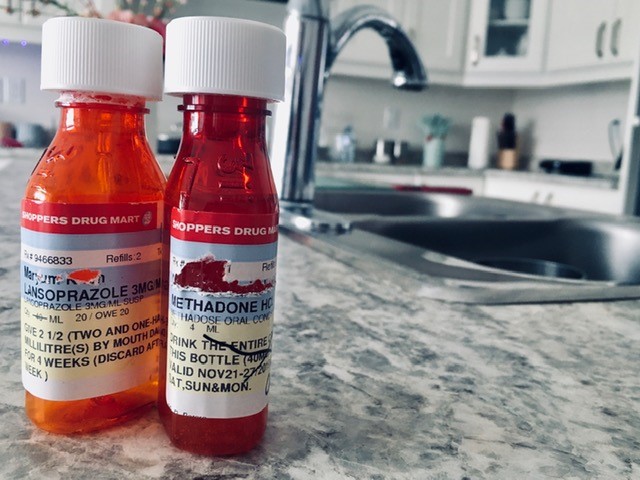Ontario’s Ministry of Health says it is not directly responsible for ensuring the province’s pharmacies are “adhering to standards of practice for the profession and that patients are receiving safe and competent care.”

“The ministry relies on its health regulatory colleges, including the Ontario College of Pharmacists,” Hayley Chazan, a spokesperson for Health Minister Christine Elliott, said in a statement.
The response follows a Global News exclusive that revealed a Brampton Shoppers Drug Mart misfilled an infant’s anti-reflux prescription with what her mother, Omayma Pathan, alleged was methadone.
“All I could think about was I had a bottle of poison and I was about to feed it to my baby with my own hands,” the first-time mother said on Friday.
But thankfully, before administering the drug, Pathan noticed the bottle, which looked identical to her five-month-old Maryum’s medication, had someone else’s name on it.

According to the head of the emergency department at North York General hospital, the consequences could be devastating if an infant were to take methadone.
“At a minimum, they would be sedated — really, really drowsy — but even in small volumes it could definitely be fatal. It would not take very much,” Dr. Paul Hannam told Global News.
In a statement, Shoppers Drug Mart revealed “human error” was to blame in five-month-old Maryum’s case.
“We share the view that this is a considerable error, and one that absolutely should not have happened. We have been in constant contact with the family to apologize, address their concerns and answer any questions,” the statement said.

Get weekly health news
“We have many controls and processes in place to protect patients. This was a case of human error, one that we do not take lightly.
“We are taking appropriate steps to reinforce the professional and operational expectations and procedures we have in place to help prevent this type of unfortunate mistake from reoccurring.”
Pathan confirmed she also spoke with the pharmacy giant and she said while she and her husband Farhad are “traumatized” by the incident, they are pleased the company is now investigating.
“They seem to be taking it seriously,” Pathan said, adding the company has offered her compensation.
But a Global News investigation also revealed this incident is not an isolated one in Ontario.
Two years after the 2016 death of eight-year-old Andrew Sheldrick who died after he was given the wrong medication at a Mississauga pharmacy, the Ontario College of Pharmacists (OCP) implemented the Assurance and Improvement in Medication Safety program (AIMS) to track these types of mistakes.
According to the latest results of that program, there were 4,426 “medication events” in Ontario over a 15-month period (between Feburary 2018 and May 2019) — that works out to approximately 300 per month.
The OCP would not say exactly how many pharmacies were involved in its preliminary study.
“I think everybody needs to work towards increasing patient safety. This isn’t a one-organization job.”
When asked, given the latest numbers, if there should be processes in place to mitigate issues such as misfills, Elliott did not at first respond. When pressed, a spokesperson issued a statement.
“The ministry encourages the OCP to continue its commitment to improve prevention of future medication incidents in community pharmacies,” the statement said.
Neil MacKinnon, the dean of the college of pharmacy at the University of Cincinnati, agreed the recent results should be further studied. He said he hopes it leads to new standardized measures.
“Do we see some trends? You know if 25 per cent are these related to stress, burnout and that type of stuff, how can we do a better job of managing that in (Canadian) pharmacies?” MacKinnon said.
The AIMS results also revealed Environmental, staffing or workflow problems were the reasons for the mistake in almost 24 per cent of cases.
Sheldrick agreed whose insights are imperative for future change.
“We are trying to look at the processes behind the counter … in their day-to-day at the pharmacies,” she explained.
The OCP said the results of the AIMS programs will eventually be passed off to an expert group for review but did not say when.
“Protecting and serving the public is our top priority as the regulator of pharmacy in Ontario and why we created the AIMS program,” a spokesperson told Global News.
Meanwhile, Pathan said she plans to use her daughter’s near-miss to advocate for these safer processes and procedures as soon as possible.
“We are trusting these people,” she said.








Comments